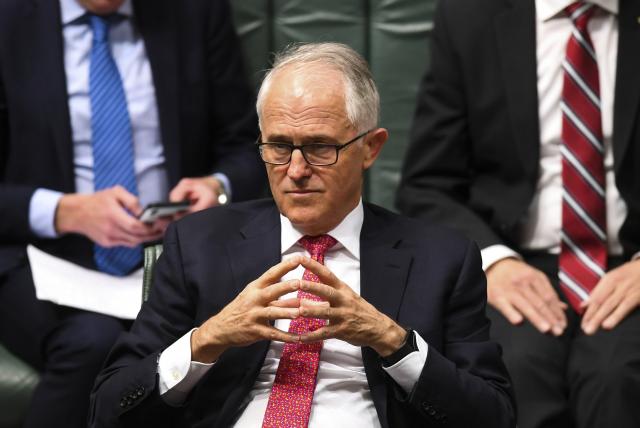Australian PM refuses to concede, dangles second leadership ballot

CANBERRA (Reuters) - Australian Prime Minister Malcolm Turnbull stubbornly clung to power on Thursday as senior ministers deserted him, saying he would hold a second leadership vote on Friday only if he received a letter signed by a majority of ruling party members.
Former home affairs minister Peter Dutton narrowly lost a challenge against Turnbull on Tuesday and has declared he would again contest a Liberal party leadership vote, while media reported the treasurer and foreign minister will also be candidates if a vote is called.
Key Turnbull supporter Finance Minister Mathias Cormann said Turnbull no longer had majority party support and Dutton was now the best person to lead the government to the next election, due by May 2019.
Several ministers have tendered their resignations. The leadership crisis saw the government adjourn parliament on Thursday until September.
Turnbull said if he received a letter requesting a fresh vote with the signatures of 43 Liberal Party lawmakers, he would call a party meeting for midday Friday (0200 GMT). If a sc-called leadership spill motion was then passed, he would not stand in the vote.
A leadership spill motion is a vote to declare the leadership of a political party vacant, allowing an open contest.
Australian media reported on Thursday that Treasurer Scott Morrison and Foreign Minister Julie Bishop would contest the top job if the spill motion is passed.
Morrison has been a Turnbull supporter, but has reportedly long held ambitions to be prime minister.
Bishop, foreign minister for almost five years, has been deputy leader of the Liberal Party since 2007.
Whoever emerges as the next prime minister will become Australia’s sixth in less than a decade. None of them, including two stints for Labor leader Kevin Rudd, have served a full term.
“Australians will be rightly appalled by what they are witnessing in their parliament,” Turnbull told reporters in Canberra.
The revolving political door has angered and frustrated voters and the business sector.
The uncertainty has clouded the outlook for investors who punished the Australian dollar AUD=D4, sending it 0.9 percent lower to $0.7283. The Aussie was the worst performing major currency on Thursday.
Australian shares are down more than 1.5 percent since the first leadership challenge this week.
“For everybody in the country what is happening in Canberra is disappointing and frustrating. Business likes certainty and confidence in what happens in the future. Anytime we see uncertainty like what is happening in Canberra it is not helpful,” said Qantas CEO Alan Joyce.







